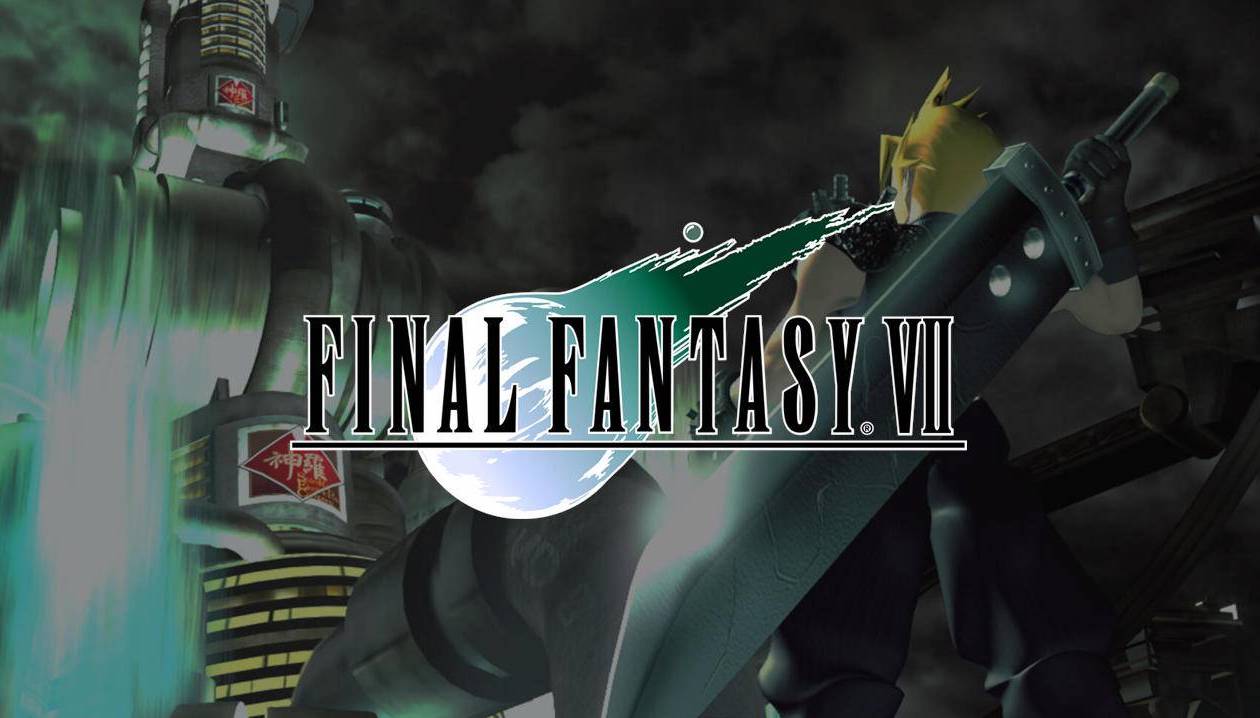Stories for Earth relies on contributions from our listeners and readers to produce high quality, in-depth content. If you buy something using the links on our website, we may earn a small commission, at no extra cost to you. For more information, see our Affiliate Disclosure.
Final Fantasy VII is a cult classic video game from the 90s, with a remake for PlayStation 4 that came out in April 2020. It might be famous for the cool and aloof Cloud Strife and characters with big swords, but Final Fantasy VII also has a lot to say about environmentalism. And just like its original release around the time the Kyoto Protocol was adopted, its message remains extremely relevant to us today.
Overview

Final Fantasy VII is a role-playing game (RPG) for the first PlayStation console. Developed by Square (now Square Enix) and released in 1997, the game is one of the most popular installments of the Final Fantasy series to date, selling over 16 million copies worldwide and helping to popularize the PlayStation console from Sony. The game follows the story of Cloud Strife, a mercenary who joins an eco-terrorist organization called AVALANCHE to help with their quest of stopping a genetically modified super-soldier named Sephiroth from destroying the planet. Along the way, Cloud and his friends in AVALANCHE must also contend with a giant extractive energy corporation called the Shinra Electric Power Company that effectively controls the world. To save the planet, Cloud and AVALANCHE have to defeat Sephiroth and end Shinra’s mining and refining of Mako to generate electricity, which is killing the planet’s life force. Final Fantasy VII was directed by Yoshinori Kitase, produced by Hironobu Sakaguchi, and features an original score from longtime Final Fantasy composer Nobuo Uematsu. A remake of the game was released on April 10, 2020 for PlayStation 4.
Jump to
About the creator
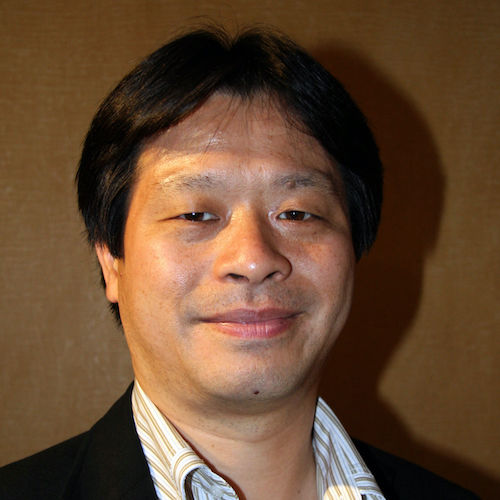
Yoshinori Kitase is a Japanese video game director and producer, best known for video games like Final Fantasy VII, Chrono Trigger, and Final Fantasy X. After studying screenwriting and filmmaking at the Nihon University College of Art, Kitase developed an interest in post-production, which led him to switch careers to the gaming industry in 1990 when he got a job at Japanese video game developer Square. Kitase is known for using his background in film to create strongly cinematic games, challenging Eurocentric imaginings of the fantasy genre, and for playing key roles in creating two of the most popular installments in the Final Fantasy series: Final Fantasy VII and Final Fantasy X. He currently works as a vice president at Square Enix.
Transcript
I’m Forrest Brown, and you’re listening to Stories for Earth.
[music: “Cold Descent” by Forrest Brown]
Welcome to Stories for Earth, a climate change podcast where we talk about stories that can help us build resilience in facing the climate crisis. If you’re catching this just after I clicked “publish,” it’s good to be back! We’ve been on a break since February, and I am excited to be jumping back into talking and writing about climate change stories.
This is a special episode. Not only because it’s the premiere of season two, but also because it’s the first episode we’ve ever done about a video game. And not just any video game—Final Fantasy VII, one of the most popular video games of all time. Some might say the best video game of all time.
But before we get to the good stuff, I have a confession: I have never played through Final Fantasy VII. Actually, I’m not even sure I’ve played Final Fantasy VII. I grew up with Final Fantasy X on PS2, but one of my neighborhood friends growing up had Final Fantasy VII. So I’ve seen someone else play the game, I just haven’t had the pleasure of experiencing it for myself. But I had heard a lot about the environmental themes of this game, and after learning more about it, it seemed like a perfect candidate for our first episode on a video game.
I should also say, this episode is not sponsored by Square Enix or any of the other folks affiliated with Final Fantasy VII, the original or the remake. I actually didn’t know they were even making a remake when I started writing this episode. I knew they’d been hinting at it for years, but I was pretty surprised to find out that it actually came out in April on PlayStation 3 or 4 or whatever it’s up to now. It does look really cool, but I’m not about to go drop a thousand dollars on a new gaming console.
Plus, overconsumption is killing the planet, which kind of makes the remake of this game a bit ironic considering its major themes. Edwin Evans-Thirlwell astutely pointed this out in a great article in The Face that I will link to on the website. Go to storiesforearth.com after listening to this episode if you want to check out that related piece and others that I found interesting.
In other news, I did not move to Portland. At the end of the season one finale on Kim Stanley Robinson I mentioned that my wife and I would be moving to Portland, Oregon at the end of April, but sadly we quickly found ourselves deeply relating to those memes that say “my plans” and “2020.” Given the severity of the COVID-19 pandemic, we didn’t think it was wise, safe, or responsible to pack everything up and make the three-day drive across the country. So for now, we’re hunkered down with family in Atlanta until it’s safe to move to Oregon.
We are doing well—thankfully staying healthy and employed, and it’s especially good to be around family at this time. I’ll spare you the speech about how we’re all in this together, but it is a scary time, particularly if you’ve been personally affected by this crisis. Just like climate change, the pandemic impacts all of us, but also like climate change, it definitely hurts some of us worse than others, especially those who are already more vulnerable and less privileged.
I don’t know your situation, but for me at least, studying the stories that I’ve covered on this podcast has helped me be more emotionally resilient in the face of COVID-19. Coming from someone who is generally pretty anxious about everything, I think that’s significant. I hope listening to these podcast episodes can you help you the same way that creating them has helped me.
With that being said, let’s talk about Final Fantasy VII and what it says about taking care of our one and only home. I hope you enjoy the show today.
“Final Fantasy VII” plot summary
On December 11, 1997, the Kyoto Protocol was adopted at the Conference of the Parties to the United Nations Framework Convention on Climate Change in Kyoto, Japan. Ratified by 192 parties, the Kyoto Protocol bound countries to an agreement to reduce greenhouse gas emissions to five percent below 1990 levels between 2008 and 2012. Of these 192 parties, two major players remained absent from the treaty—the United States of America and China, the two largest emitting countries in 2018.
Today, most people count the Kyoto Protocol as a failure due to many of the signatories failing to meet their emission reduction targets. And even looking at the countries that did manage to meet their targets, some of their reductions could be attributed to what New Scientist calls “carbon leakage,” which is when one country simply transfers its emissions to another country instead of actually cutting them. These emissions likely moved to developing countries like China where manufacturing is big business.
But not everyone counts the Kyoto Protocol as a total loss. The fact that 192 parties were able to agree on a plan—albeit a modest one—to fight climate change was a big deal, showing that global concern about climate change was on the rise and paving the way for the Paris Agreement in 2016. However, exactly three years after the United States ratified the Paris Agreement, the Trump administration withdrew the US on November 4, 2019. China still remains committed to its Paris Agreement targets, with some studies suggesting it could even reach peak emissions ten years early.
Regardless, the world is still on track to burn through our remaining carbon budget, according to Grist. This comes even after the Intergovernmental Panel on Climate Change—the IPCC—expanded the world’s carbon budget in its special report on 1.5º C. This is scary information for a scary time, but even as the threat of climate change looms over our heads and the COVID-19 pandemic ravages the world, little rays of hope are breaking through the clouds.
The concerted global response to fighting the novel coronavirus shows the world can work together quickly to fight macro threats like climate change, and global shutdowns to prevent faster spread of the virus are causing oil companies to go out of business while renewables like solar and wind continue to grow, even if slower. In dark times, it helps to turn our attention to facts like these to encourage us to keep up the fight against climate change. But stories can also give us strength, which is why the release of the Final Fantasy VII Remake on April 10 could not have come at a better time.
What does “Final Fantasy VII” have to do with climate change?
Originally released in January 1997—roughly 11 months before the Kyoto Protocol was adopted—Final Fantasy VII quickly became one of the most popular installments in the Final Fantasy series and one of the most beloved video games of all time.
A role playing game (RPG), Final Fantasy VII tells the story of Cloud Strife, a young mercenary who gets hired to help an eco-terrorist organization called AVALANCHE fight the nefarious Shinra Electric Power Company. After a failed attack on Shinra that results in the deaths of thousands of innocent civilians, Cloud and his party discover Shinra’s extractive energy operation is only part of a larger problem. You see, one of the company’s failed genetic experiments, a man named Sephiroth, has gone mad, slaughtering the company’s president and embarking on a quest to harness an ancient power that will destroy the planet. To save the planet, Cloud and his friends must stop Sephiroth and the Shinra Electric Power Company from totally draining the planet’s life force.
Mako energy and fossil fuels
Before the story begins, the Shinra Electric Power Company used to be a weapons manufacturer. That all changed when it discovered Mako, which is a liquid form of spirit energy from something called the Lifestream. In Final Fantasy VII, the Lifestream is a river of spirits that flows beneath the planet’s surface, giving life to all beings and literally holding the planet together. When something dies, it returns to the Lifestream as part of the endless cycle of birth, death, and rebirth that sustains all life. Shinra learned to extract this energy and harness it for electricity production, building giant Mako reactors all over the world and effectively becoming a giant corporatocracy with its headquarters in Midgar, the metropolis where Cloud and his friends live.
As you might have guessed, extracting Mako is literally killing the planet. Shinra is gradually sucking away the planet’s life and using Mako in combination with cells from a malicious alien life form called Jenova to conduct bizarre and disturbing genetic experiments on living creatures, including humans like Sephiroth. While we don’t have a malignant extraterrestrial life form on Earth, it’s impossible to overlook the parallels between Shinra and modern day fossil fuel companies. Like Shinra, oil and gas companies extract liquid energy from once-living beings—in our case, mostly zooplankton and algae—to produce power for our homes, cars, factories, airplanes, and ships. Doing so produces greenhouse gases, which are the leading cause of the climate crisis.
And while oil companies are not technically the government, there’s no denying they exert an enormous influence on politics, especially in the United States. In 2005, a Washington Post investigation found that Vice President Dick Cheney—head of President George W. Bush’s energy task force—held a secret meeting with representatives from the oil companies Exxon Mobil, Conoco, Shell, BP America, and Chevron. These companies made policy recommendations to the Bush administration that resulted in billions of subsidies and tax cuts for the fossil fuel industry, according to PBS. Oh, and both George W. Bush and Dick Cheney are former oil executives themselves.
This corruption continues today, with oil companies donating large sums of money almost exclusively to the Republican Party. In fact, OpenSecrets.org reports that over two-thirds of the industry’s political financial contributions have gone to Republicans since 1990. For the 2019-2020 election cycle, only three politicians out of the top 20 recipients were Democrats: Beto O’Rourke, Pete Buttigieg, and Henry Cuellar. Republicans comprise the other 17 spots in the top 20, with Donald Trump receiving nearly $300,000 from the oil and gas industry. These contributions from the fossil fuel industry are indicative of a larger corruption issue in America and can certainly be attributed to the extreme partisan split between Democrats and Republicans on the reality and threat of climate change.
The Weapons and the increase of natural disasters
But political corruption isn’t the only climate change-related issue that Final Fantasy VII tackles. The game focuses heavily on the damage being done to the planet and the ways in which it tries to protect itself. As I mentioned earlier, there’s an evil alien life form in the game called Jenova that came to the planet two thousand years ago. In self-defense, the planet created several behemoth-sized guardians called Weapons to fight Jenova, but they were never actually needed until Sephiroth, the main villain, tries to destroy the planet.
The Shinra Electric Power Company created Sephiroth by accident when they were trying to create a genetically modified soldier. In a Midgar lab where they conducted all kinds of top-secret and unethical experiments, Shinra scientists fused Sephiroth’s genetic makeup with a dangerous cocktail of Mako particles and Jenova cells, accidentally turning him into a psychopathic monster. After Sephiroth’s transformation, Jenova started using him to try to absorb the planet’s lifeforce, which would effectively make him a god. But harvesting the power from the lifeforce required Sephiroth to damage the planet severely to make the lifeforce vulnerable.
Sephiroth uses the powers he gains throughout the game to summon a powerful ancient magic called Meteor—a literal meteor that will crash into the planet and all but destroy it. When this happens, the Weapons wake up and start looking for the threat to the planet. Sephiroth manages to hide from the Weapons, leading them to attack the next most likely threat to the planet: the Shinra Electric Power Company. While Shinra is certainly the reason why all this is happening, untold numbers of innocent people will die if the Weapons succeed in destroying Shinra. Shinra’s base of operations are primarily in two cities—Midgar and Junon—and the Weapons intend to completely destroy the cities.
Faced with few other choices, Cloud Strife and friends team up with Shinra to fight and destroy the Weapons before they can destroy Midgar and Junon. Even though Cloud and Shinra were enemies at the beginning of the game, they unite in the face of an existential threat.
In much the same way that the planet of Final Fantasy VII has its own self defense mechanisms in the face of imminent destruction, our own planet seems to operate in similar methods. The Weapons could be seen as a metaphor for natural responses to human-caused climate change. Sea level rise, more intense hurricanes, flooding, drought, and dangerously high temperatures all threaten to wreak havoc on life on Earth, and working to mitigate climate change is the only thing we can do to stop that from happening.
I don’t believe in a sort of sentient life force that is knowingly trying to save itself from humans, but I do find the parallels between Final Fantasy VII’s Weapons and Earth’s natural disasters compelling. And while energy corporations are typically framed as villains (and rightly so, in my opinion), they will be crucial in the fight against climate change. In the face of such an existential threat, climate action advocates and energy companies will need to work together to decarbonize every aspect of human activity.
And while this is very controversial right now, some might say that without oil and gas companies, we can’t effectively fight climate change. A recent article from the Atlantic Council cites oil and gas companies as necessary for their ability to develop so-called transition fuels like natural gas and hydrogen, and many people are now pointing out that the economic fallout from the COVID-19 pandemic could actually hurt climate action efforts.
Yet there are reasons to believe that global threats could push us in the right direction. In Europe, it seems likely that the EU will pass a Green Deal to help pull Europe out of the coming economic crisis caused by the pandemic, with South Korea planning to implement similar stimulus measures. The Weapons in Final Fantasy VII are warning shots from an endangered planet, but they also show the potential for people—even enemies—to work together when faced with imminent destruction.
The shapeshifting and mind-controlling power of Jenova and misinformation
Cloud Strife and his friends go on to defeat Sephiroth just before he’s able to use Meteor to destroy the planet, but there were many times before this when they thought they’d defeated him earlier. Like I said, Jenova was controlling Sephiroth to try to take the powers of the Lifestream. And throughout the game, Jenova actually shapeshifts to look like Sephiroth. It’s a frustrating trick, but it’s hardly the most sinister power Jenova uses. It’s also able to control people’s minds, and it does just that to Cloud at one point in the game.
There’s a part in Final Fantasy VII where Cloud suffers from an extreme identity crisis, though not because he loses sight of who he is. Instead, Jenova uses its mind controlling powers to give Cloud false memories that make him question who he thought he was. Call it gaslighting to the extreme. It gets so bad that Cloud has to step away from the main mission to focus on trying to remember who he is. He manages to figure out that Jenova was tricking him, but it certainly wasn’t easy.
I wouldn’t go so far as to suggest that fossil fuel companies are capable of mind control, but they certainly are capable of producing pretty harmful propaganda campaigns. Just as other dubious industries like the tobacco industry have done, the fossil fuel industry has been intentionally sowing public doubt of science for decades, all the way back to the late 1970s, in fact.
In 1978, a researcher at Exxon named James Black wrote an internal report that directly linked an increase in CO2 emissions to global temperature rise. The report says, “A doubling of carbon dioxide is estimated to be capable of increasing the average global temperature by from 1° to 3°C, with a 10°C rise predicted at the poles.”
This little bit of information is interesting considering Exxon and other oil companies have spent millions of dollars over the years funding misinformation campaigns to discredit these findings. For the full history, The Climate Reality Project has a great article that I’ll link to in the podcast description, but for the sake of brevity, here’s a quick summary.
In 1978, the Exxon researcher James Black published that internal report stating that CO2 increases in the atmosphere would make the planet significantly hotter. Two years later at the 1980 American Petroleum Institute meeting, researchers from Exxon, Texaco, and Shell predicted massive increases in global temperatures throughout the 21st century, all of which they said would lead to massive global instability and major economic damages. That’s not to mention the destruction of the world and the extinction of millions of species.
Despite knowing this, the fossil fuel industry went full steam ahead on funding climate denial. They did this by pumping money into right-wing think tanks to produce pseudoscience reports to convince citizens and government officials that climate change isn’t caused by human activity and that, even if it is, the consequences won’t be that bad. Some of these think tanks include the Cato Institute, the Heritage Foundation, and the Heartland Institute, which was founded by the notorious Koch brothers.
The fossil fuel industry also funds climate change denying scientists, having them make media appearances in an effort to make denying climate science seem like an opposite but equal point of view. Of course, there’s broad scientific consensus about the reality of anthropogenic climate change, but this move plays to the media’s aim to be fair and balanced, to report both sides of the story. In essence, the fossil fuel industry succeeded in convincing many people that there isn’t widespread agreement among climate scientists about climate change. And just like we see in Final Fantasy VII, sometimes all it takes is a seed of doubt for people to completely shut down.
The obvious response to this is to follow Cloud’s lead and search hard for the truth. Climate change denying propaganda is well-documented. I mentioned The Climate Reality Project already, but reputable news organizations such as the Washington Post and the Guardian have also documented efforts by the fossil fuel industry to gaslight the public. It’s not a secret—it’s just that many people still haven’t heard about it or don’t know the details. Arming ourselves with knowledge about these efforts and learning from other failed attempts to squash science can help us fight back against the confusion that fossil fuel companies have spread.
Persistence is key
But doing this is not easy work. We’ve already made massive progress in recent years with things like school strikes for climate action around the world—especially in Europe—but really holding the fossil fuel industry accountable for what they’ve done will take time and perseverance. This will come as no shock to people who have been fighting for climate action for years, but to those of us who are relatively new to the movement, this can be challenging to wrap our minds around. Contrary to how we’ve been conditioned to expect instant gratification, moving the needle on climate action has not and will not happen overnight. This is a long battle that’s already been raging for decades. It’s true that great strides have been and are being made, but we’re far from being done with saving our planet.
The characters in Final Fantasy VII are great examples of what it looks like to persevere in the face of adversity. As the fight against Sephiroth and the Shinra Electric Power Company intensifies, things look bleaker and bleaker for Cloud and his friends. In fact, even after they manage to defeat Sephiroth and Jenova, it’s too late to completely stop Meteor from crashing into the planet. They do their best to stop it from destroying everything, but it still causes massive amounts of destruction as fragments of the extraterrestrial projectile fall to the planet.
At the end of the game, it seems at first that Cloud and his friends fought in vain to stop Meteor. Midgar is deserted and left in ruins and nature begins to reclaim the city. You start to think that everyone is dead, that Meteor caused enough damage to wipe out humanity even though its blow was softened. But at the last minute, one of Cloud’s friends appears, Red XIII, looking out over the city from a high point. Humanity survived after all, but it’s presumably approaching its relationship with the planet from a different, healthier perspective. For many years, that’s the only ending players got to Final Fantasy VII, but a couple of follow up games and a movie were released in more recent years that shed some more light on what happens to Cloud and his friends following the fall of Sephiroth and Shinra.
So what does all of this mean for us? Well, we have to keep going, for one. It seems as though the oil and gas industry will cling to fossil fuels for as long as they can, but if we want to save our planet, we can’t let that happen. We can’t do this alone, either. Even though Cloud Strife has a sort of lone wolf mystique about him, he couldn’t have accomplished anything without the help of his friends, especially his friend Aerith.
I could probably do another episode on Cloud and Aerith’s relationship alone, but the most important detail about Aerith for the sake of this discussion is that she was part Cetra—the indigenous people of the planet in Final Fantasy VII. Without the Cetra knowledge and skills that Aerith possessed, no progress would have ever been made in the fight against Sephiroth and Shinra. There are also indigenous people on our planet, though their populations are rapidly dwindling. We have so much to learn from their way of life and their deep respect for the Earth, so protecting them becomes a path toward survival for all of us in addition to a basic imperative of being a decent person. We’ll talk more about what indigenous communities can teach us in our episode on the Native American poet Joy Harjo, but for now, I think it’s helpful to reflect on everything Final Fantasy VII says about fighting to save our world.
Outro
Stories for Earth is written and produced by me, Forrest Brown. The intro and outro music is also by me. If you want to learn more about what we’re up to, you can find us on Instagram at @storiesforearth and on Twitter at @stories4earth. That’s the word “stories,” the number “4,” and the word “earth.” Our website is storiesforearth.com, where you can also find links to support us financially through Patreon and through our Bookshop.org page.
For this episode, I’d like to give a special shout out to Oni Black Mage on YouTube for his exhaustive recapitations on many video games, particularly Final Fantasy VII. Since I haven’t played through Final Fantasy VII myself, I couldn’t have made this episode without his work. Thanks, Oni Black Mage.
Thank you so much for listening, and I hope you’ll tune back in next month for season two, episode two.
Recommendations
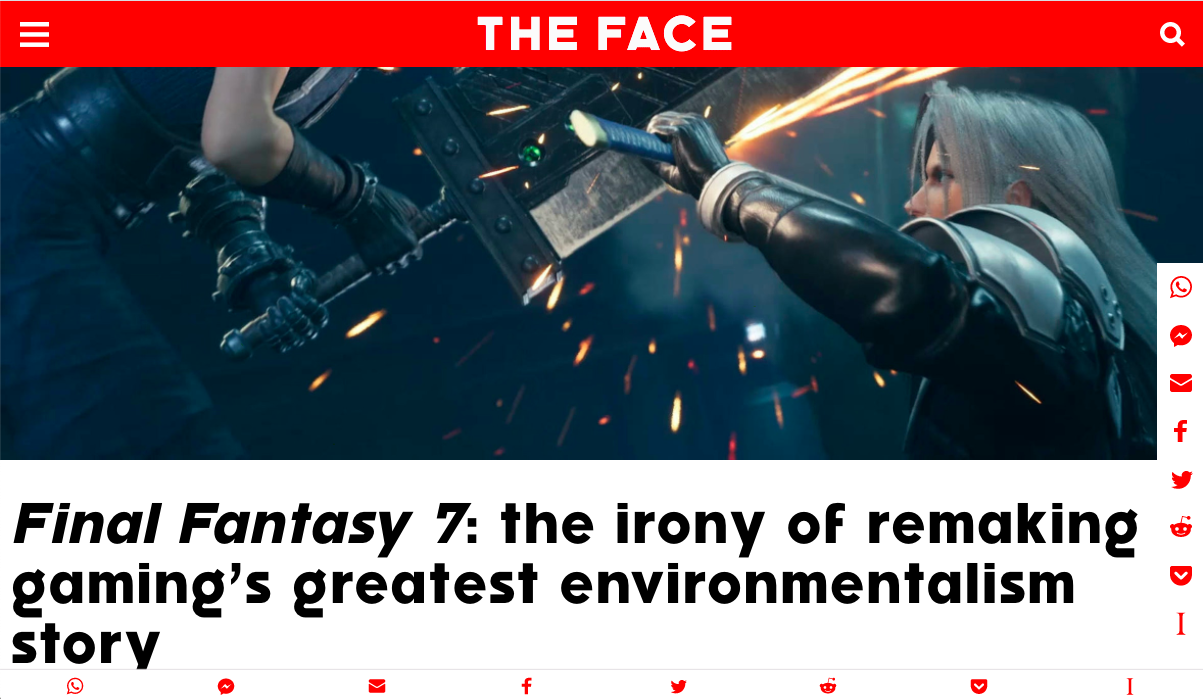
Article: “Final Fantasy 7: the irony of remaking gaming’s greatest environmentalism story” by Edwin Evans-Thirlwell in The Face
Video: “What happened in Final Fantasy VII? (RECAPitation)” by Oni Black Mage on YouTube
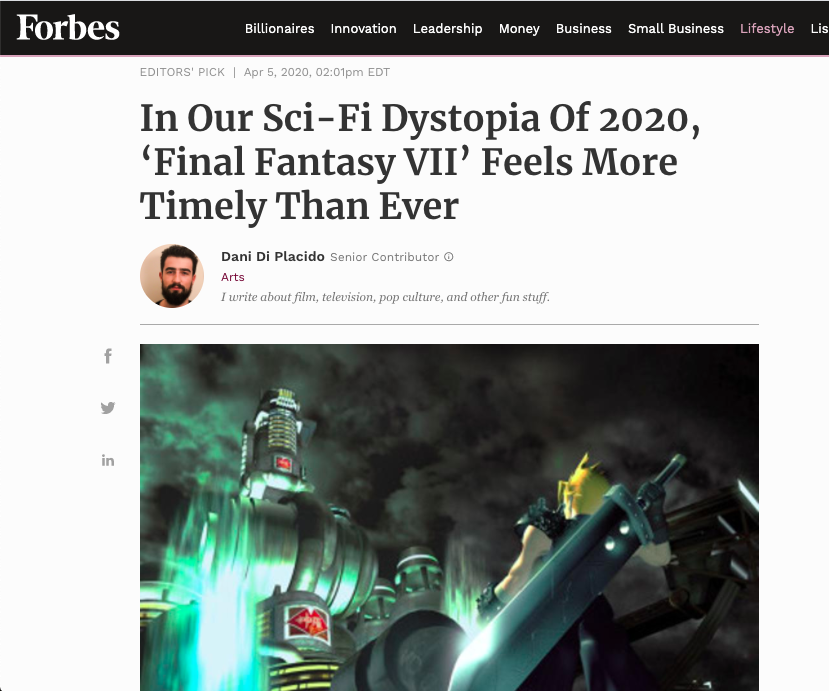
Article: “In Our Sci-Fi Dystopia Of 2020, ‘Final Fantasy VII’ Feels More Timely Than Ever” by Dani Di Placido in Forbes
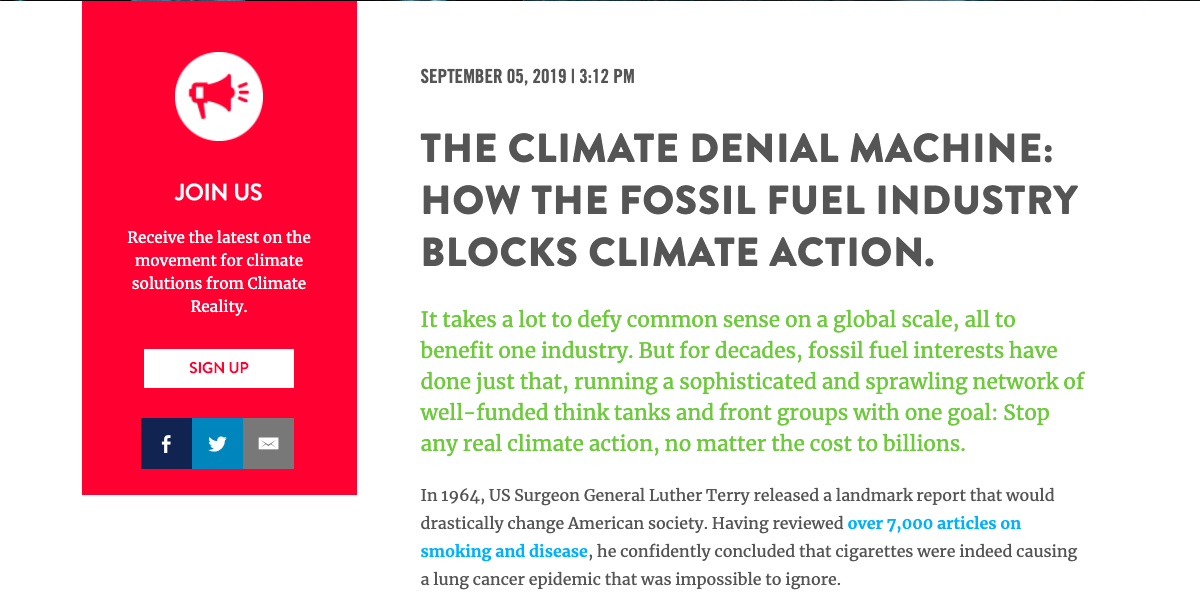
Article: “The Climate Denial Machine: How The Fossil Fuel Industry Blocks Climate Action.” in The Climate Reality Project.
